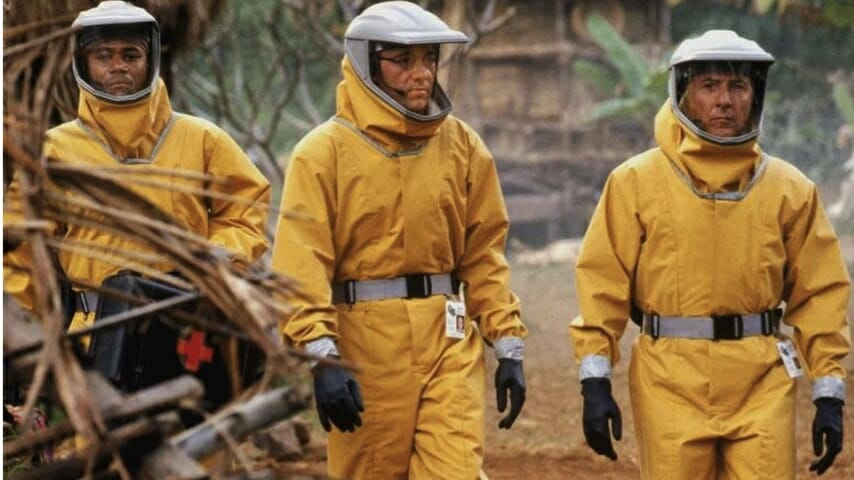
It can feel like the world is ending right now, as the number of Coronavirus cases climbs over 1 million, and the death toll creeps towards 100,000, stores are shuttered and millions have become unemployed. So some were surprised when the film Contagion, which showed a world crippled by a spreading virus, became one of the most popular older films on several streaming platforms and spiked on Google Trends. Why would anyone want to watch a fictional apocalypse when we were facing one in reality? If you’ve come to this page, you know the answer. We’re here to help, listing out the best “end of the world” movies on Netflix. Sometimes it helps to see films mirror our own lives, even if that fictional version is amped up to 11. It’s heartening to see our movie heroes push back against impending doom, to fight it in ways we can’t when shelter-in-place advisories are the new norm.
If you want to escape from our own catastrophe for two hours, we recommend the following apocalyptic or post-apocalyptic movies. The end may come in the form of a virus, intelligent robots, aliens, natural disaster or nuclear winter, but humanity has been imagining how it all ends since there was civilization to end. And lately, that often involves a tiny microbe.
Here are the 10 best “end of the world” movies on Netflix:
1. The Matrix Year: 1999
Year: 1999
Directors: Lilly Wachowski, Lana Wachowski
Stars: Keanu Reeves, Laurence Fishburne, Carrie-Anne Mos, Joe Pantoliano, Hugo Weaving
Rating: R
Runtime: 136 minutes
There is not much to say about the film that made cyberpunk not stupid—and therefore is the best cyberpunk movie ever made—or that made Keanu Reeves a respectable figure of American kung fu, or that finally made martial arts films a seriously hot commodity outside of Asia. The Matrix is—next to the Wu-Tang Clan—what proved to a new generation that martial arts films were worth their scrutiny, and in that reputation is bred college classes, heroes’ journeys and impossible expectations for special effects. While there are plenty better, there is no movie in the canon of martial arts films bigger than The Matrix, and even today we still have this film to thank for so much of what we love about modern kinetic cinema. This is our red pill; everything else is an illusion of greatness and everything else is an allusion to what the Wachowskis accomplished. —Dom Sinacola
2. Avengers: Infinity War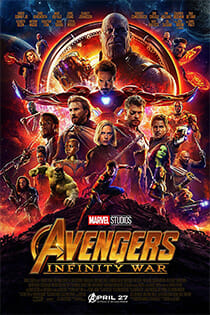 Year: 2018
Year: 2018
Directors: Anthony Russo, Joe Russo
Stars: Robert Downey Jr., Chris Evans, Chris Hemsworth, Chris Pratt, Mark Ruffalo, Scarlett Johansson, Benedict Cumberbatch, Chadwick Boseman, Don Cheadle, Elizabeth Olson, Tom Holland, Zoe Saldana, Tom Hiddleston
Rating: PG-13
Runtime: 156 minutes
Avengers: Infinity War is epic in a way that has been often aspired to but never fully grasped when it comes to the translation from comic book panel to the Big Screen. It’s what happens when moviemakers take their source material seriously, eschewing unnecessary melodrama even as they fully embrace the grandeur, the sheer spectacle, of it all. (And if there’s one lesson Disney has learned, it’s that if you focus on the viewer experience, the product lines will take care of themselves.) For every frenetic fight scene in Avengers: Infinity War—and there are plenty of them—there are myriad character interactions and emotional beats the audience has been prepped for by the previous films (okay, maybe not 2008’s The Incredible Hulk). As a result, writers Christopher Markus and Stephen McFeely have ample room to riff and play as characters meet for the first time or see each other again. Some of the interactions are easy to anticipate (if no less enjoyable)—the immediate ego clash between Cumberbatch’s Dr. Strange and Downey Jr.’s Iron Man, for example—but our familiarity with these characters adds resonance to nearly every scene and every line, as the vestiges and ripples of emotional arcs laid down in the last decade’s worth of movies bolster even the smallest moment. —Michael Burgin
3. Train to Busan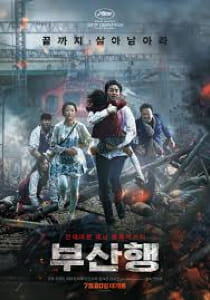 Year: 2016
Year: 2016
Director: Yeon Sang-ho
Starring: Gong Yoo, Ma Dong-seok, Jung Yu-mi, Kim Su-an, Kim Eui-sung, Choi Woo-shik, Ahn So-hee
Rating: NR
Runtime: 118 minutes
Love them or hate them, zombies are still a constant of the horror genre in 2016, dependable enough to set your conductor’s watch by. And although I’ve probably seen enough indie zombie films at this point to eschew them from my viewing habits for the rest of my life, there is still usually at least one great zombie movie every other year. In 2016, that was Train to Busan, a film that I sadly hadn’t yet seen when I wrote the 50 Best Zombie Movies of All Time. There’s no need for speculation: Train to Busan would undoubtedly have made the list. This South Korean story of a career-minded father attempting to protect his young daughter on a train full of rampaging zombies is equal parts suspenseful popcorn entertainment and genuinely affecting family drama. It concludes with several action elements that I’ve never seen before, or even considered for a zombie film, and any time you can add something truly novel to the genre of the walking dead, then you’re definitely doing something right. With a few memorable, empathetic supporting characters and some top-notch makeup FX, you’ve got one of the best zombie movies of the past half-decade. —Jim Vorel
4. It Comes at Night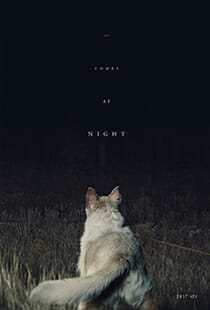 Year: 2017
Year: 2017
Director: Trey Edward Shults
Stars: Joel Edgerton, Christopher Abbott, Carmen Ejogo, Kelvin Harrison Jr., Riley Keough
Rating: R
Runtime: 91 minutes
Within seconds, It Comes at Night haunts you. In the scene from which writer/director Trey Edward Shults says the rest of his script sprung, in the very first images of the film, an old man (David Pendleton) wheezes while covered, his skin festering, in boils. It’s clear: He isn’t long for this world. Shults and DP Drew Daniels hold his face in close-up as if they’re cradling him, trying to make his passing easier. Each successive detail is revealed with a carefulness that could only be described as some sort of deep, abiding empathy for the characters, any characters, Shults has on screen: first comes the man’s defeated face, his labored breathing, then the muffled voices of reassurance, telling him it’s OK to let go and that he’s loved. Then we see that the voices are muffled because they’re coming from gas masks. Then we watch as the people wearing gas masks roll the old man in a wheelbarrow out to the woods where they shoot him in the head and incinerate his corpse in a hole. It Comes at Night is ostensibly a horror movie, moreso than Shults’s debut, Krisha, but even Krisha was more of a horror movie than most measured family dramas typically are. Perhaps knowing this, Shults calls It Comes at Night an atypical horror movie, but—it’s already obvious after only two of these—Shults makes horror movies to the extent that everything in them is laced with dread, and every situation suffocated with inevitability. For his sophomore film, adorned with a much larger budget than Krisha and cast with some real indie star power compared to his previous cast (of family members doing him a solid), Shults imagines a near future as could be expected from a somber flick like this. A “sickness” has ravaged the world and survival is all that matters for those still left. In order to keep their shit together enough to keep living, the small group of people in Shults’s film have to accept the same things the audience does: That important characters will die, tragedy will happen and the horror of life is about the pointlessness of resisting the tide of either. So it makes sense that It Comes at Night is such an open wound of a watch, pained with regret and loss and the mundane ache of simply existing: Throughout we feel as if we’re saying goodbye to these characters even as we’re just getting to know them. It’s trauma as tone poem, bittersweet down to its bones, a triumph of empathetic, soul-shaking movie-making. —Dom Sinacola
5. Cloverfield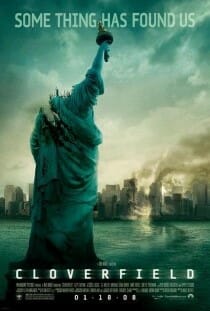 Year: 2008
Year: 2008
Director: Matt Reeves
Stars: Lizzy Caplan, Jessica Lucas, T.J. Miller, Michael Stahl-David, Mike Vogel, Odette Yustman
Rating: PG-13
Runtime: 90 minutes
When Matt Reeves dropped Cloverfield on unsuspecting multiplex audiences in 2008, it quickly became painfully clear that the average viewer wasn’t quite ready to absorb what he was dishing out. Today, the same film would no doubt arrive as a streaming original feature from the likes of Netflix or Amazon, where its genre-redefining camera perspective would be less of a risk. That Cloverfield hit theaters in wide release at all is actually something of a marvel, considering how profoundly different it was in a visual sense from anything that the majority of its viewers had ever seen before. The film is of course on some level a “monster movie,” but it’s one where the primary creature is never the center of the film’s attention, precisely because we spend our time following regular folks who are in no way responsible for or connected to its rampage through New York City. For the film’s entire duration, we see only what they see, cleverly capturing one aspect of the true horror present in disaster situations—the very likely reality that no one present will have any idea what is happening, or any idea of what to do about it. Cloverfield puts its characters into some insane situations, but never breaks the trust it establishes that this is a bystander-eye’s view. No four-star general suddenly shows up to explain what’s going on, or empower our protagonists to take on the creature. No key to the creature’s origin is unearthed. It’s just a shaky-cam tribute to the idea that utter chaos can run rampant in one’s life, and there may be not a damn thing you can do about it. —Jim Vorel
6. Snowpiercer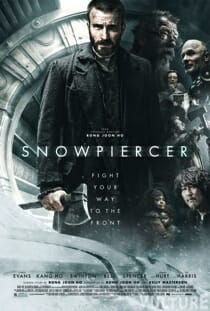 Year: 2014
Year: 2014
Director: Bong Joon-ho
Stars: Chris Evans, Tilda Swinton, John Hurt, Song Kang-ho, Jamie Bell, Octavia Spencer, John Hurt
Rating: R
Runtime: 126 minutes
There is a sequence midway through Snowpiercer that perfectly articulates what makes Korean writer/director Bong Joon-ho among the most dynamic filmmakers currently working. Two armies engage in a no-holds-barred, slow motion-heavy action set piece. Metal clashes against metal, and characters slash through their opponents as if their bodies were made of butter. It’s gory, imaginative, horrifying, beautiful, visceral and utterly glorious. Adapted from a French graphic novel by Jacques Lob, Benjamin Legrand and Jean-Marc Rochette, Snowpiercer is a sci-fi thriller set in a futuristic, post-apocalyptic world. Nearly two decades prior, in an ill-advised attempt to halt global warning, the government inundated the atmosphere with an experimental chemical that left our planet a barren, ice-covered wasteland. Now, the last of humanity resides on “Snowpiercer,” a vast train powered via a perpetual-motion engine. Needless to say, this scenario hasn’t exactly brought out the best of humanity. Bong’s bleak and brutal film may very well be playing a song that we’ve all heard before, but he does it with such gusto and dexterous skill you can’t help but be caught up the flurry. —Mark Rozeman
7. Cargo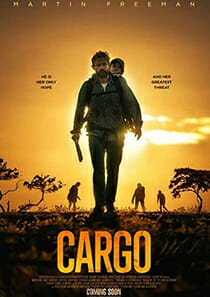 Year: 2018
Year: 2018
Directors: Yolanda Ramke, Ben Howling
Stars: Martin Freeman, Simone Landers, Anthony Hayes, David Gulpili, Susie Porter, Caren Pistorius
Rating: NR
Runtime: 105 minutes
We’ve had enough takes on worldwide zombie apocalypses to last undead enthusiasts long through, well, a worldwide zombie apocalypse. Of those takes, few are inspired, a few more are watchable though workmanlike and most are dreck, whether in TV or movie form. Cargo, a collaborative directing effort between Yolanda Ramke and Ben Howling, falls somewhere in between “inspired” and “workmanlike,” which is to say it’s well worth seeking out on Netflix if you’ve a powerful need to watch twitching, walking corpses menace a family trying to survive while isolated in Australia’s Outback. Martin Freeman plays Andy, stubborn husband to his wife, Kay (Susie Porter), and loving dad to their daughter, Rosie; he’s piloting a houseboat to safer shores, or that’s the hope. Then Kay takes a zombie bite, forcing a change of plans and setting them down the path to ruin and tragedy. For a certain kind of horror purist, Cargo denies the expectations of the genre. It’s not an especially scary movie. It is, however, a moody, atmospheric movie, replacing scares with a nearly overwhelming sense of sadness. If that’s not enough for you, then at least be sated by the excellent FX work. Here, zombies present as victims of debilitating illness: A waxen, carious fluid seeps from their eyes and mouths, which is suitably nauseating in the stead of workaday splatter. All the same, Cargo is never half as stomach-churning as it is simply devastating. —Andy Crump
8. Ravenous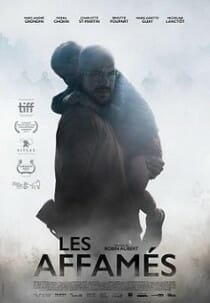 Year: 2017
Year: 2017
Director: Robin Aubert
Stars: Marc-André Grondin, Monia Chokri, Brigitte Poupart, Luc Proulx, Charlotte St-Martin
Rating: NR
Runtime: 96 minutes
Genre geeks didn’t seem to take a lot of notice of Ravenous, beyond its Best Canadian Film award at the Toronto International Film Festival—perhaps the result of an “indie zombie drama” subgenre that seems to have run its course through films such as The Battery, and perhaps because it’s performed in French rather than English. Regardless, this is a competently crafted little drama thriller for the zombie completist, full of excellent performances from no-name actors and an intriguing take on the results of zombification. The infected here at times seem like your standard Romero ghouls, but they’re also a bit more: lost souls who have hung onto some kind of strange, rudimentary culture all their own. These aspects of the zombie plague are always hinted at, never extrapolated, but it enhances the profound feelings of loss and sadness present in Ravenous. —Jim Vorel
9. The Girl With All the Gifts Year: 2016
Year: 2016
Director: Colm McCarthy
Starring: Gemma Arterton, Paddy Considine, Glenn Close, Sennia Nanua
Rating: R
Runtime: 111 minutes
M.R. Carey’s novel The Girl With All the Gifts plays coy with its zombie (or “hungries,” as they’re called here) trappings, drawing readers in for dozens of pages before revealing its flesh-eating premise. The film adaptation, released last year in the U.K. before making its U.S. debut in February, bares its teeth right away. If viewers aren’t burnt out on zombie offerings (and they shouldn’t be, with such recent standouts as 2016’s Korean hit Train to Busan proving that the genre has plenty of life left in it), they’ll find that The Girl With All the Gifts is less concerned with the initial overwhelming outbreak than with the moral lines survivors in the military and scientific community are willing to cross. Director Colm McCarthy, working from a screenplay by Carey himself, doesn’t skimp on the swarming carnage, often rendering attacks in brutal, fully lit scenes, but the most frightening tension comes from a menacing, single-minded Glenn Close as a scientist with few scruples. Young actress Sennia Nanua as Melanie, the “hungry” most in control of her impulses, gives the crowded zombie genre one of its only truly heroic performances, enshrining The Girl With All the Gifts as the bloody heir to George Romero’s misunderstood-at-the-time classic Day of the Dead. —Steve Foxe
10. Outbreak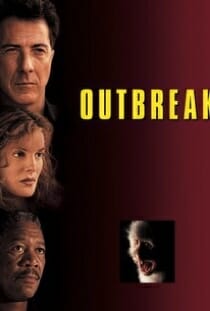 Year: 1995
Year: 1995
Director: Wolfgang Petersen
Starring: Dustin Hoffman, Rene Russo, Morgan Freeman, Donald Sutherland, Cuba Gooding Jr., Patrick Dempsey, Kevin Spacey
Rating: R
Runtime: 128 minutes
Although now hailed as frighteningly prescient in the wake of the worldwide coronavirus pandemic, 1995’s Outbreak was, at its time, a fairly conventional disaster film of the same era that gave us the likes of Dante’s Peak or Armageddon. Built around a strong cast of dependable, A-list Hollywood performers, it does make the significant choice to make its protagonists a group of virologist and epidemiologists, a segment of real-life heroes rarely explored or acknowledged in cinema. Its depiction of an actual epidemic “outbreak,” though, is pure Hollywood fluff, inventing modes both of how diseases spread and are treated—don’t go watching this expect to see anything relevant to the world as it exists today. Outbreak is often a taut thriller, however, and does a good job of evoking the universal danger inherent to an enemy that is potentially invisible and all around you. Like the best segments of Chernobyl, the audience worries its heroes are slowly succumbing to a monster that simply can’t be fought. —Jim Vorel